Lahore: Difference between revisions
m remove links to broken and archived websites. |
|||
| Line 77: | Line 77: | ||
Lahore was the head-quarters of the [[Punjab Light Horse]] and of the [[Punjab Rifles|1st Punjab Volunteer Rifles]].<ref>[http://www.archive.org/stream/imperialgazette05unkngoog#page/n72/mode/1up ''Imperial Gazetteer of India : Provincial Series Punjab Volume II The Lahore, Rawalpindi and Multan Divisions and Native States''], page 40 1908 Archive.org</ref> [http://www.emule.com/2poetry/phorum/read.php?4,12692 "A Beleagured City"],is a parody by Rudyard Kipling about the proximity of the firing range of the Punjab Volunteer Rifles to the Lawrence Hall Gardens | Lahore was the head-quarters of the [[Punjab Light Horse]] and of the [[Punjab Rifles|1st Punjab Volunteer Rifles]].<ref>[http://www.archive.org/stream/imperialgazette05unkngoog#page/n72/mode/1up ''Imperial Gazetteer of India : Provincial Series Punjab Volume II The Lahore, Rawalpindi and Multan Divisions and Native States''], page 40 1908 Archive.org</ref> [http://www.emule.com/2poetry/phorum/read.php?4,12692 "A Beleagured City"],is a parody by Rudyard Kipling about the proximity of the firing range of the Punjab Volunteer Rifles to the Lawrence Hall Gardens | ||
[http://www.rafweb.org/Stations/Stations-L.htm#Lahore RAF Lahore] rafweb.org (retrieved 1 July 2014) | |||
==Transport== | ==Transport== | ||
Revision as of 11:56, 1 July 2014
| Lahore | |
|---|---|
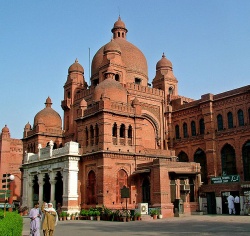
| |
| Presidency: Bengal | |
| Coordinates: | 31.545073°N 74.340835°E |
| Altitude: | 217 m (712 ft) |
| Present Day Details | |
| Place Name: | Lahore |
| State/Province: | Punjab |
| Country: | Pakistan |
| Transport links | |
| FibiWiki Maps | |
|---|---|
| See our interactive map of this location showing places of interest during the British period | |
| Lahore |
Lahore was the headquarters of Lahore District in the Lahore Division of Punjab Province during the British period.
It was the capital of undivided Punjab until Partition in 1947 after which it became the capital of West Punjab in Pakistan.
History
1905 earthquake
- Lahore, page 131, Photographs of Lahore, rear of book, computer page 467 Memoirs of the Geological Survey of India Volume XXXVIII The Kangra Earthquake of 4th April 1905 by CS Middlemiss, Superintendent, Geological Survey of India 1910, reprinted 1981 Archive.org
- Lahore and the 1905 [Kangra] earthquake from Baduwi (1905): Index to Volume 1 from Roger Bilham’s website
Spelling Variants
Modern spelling: Lahore
Variants: Lahaur
Churches
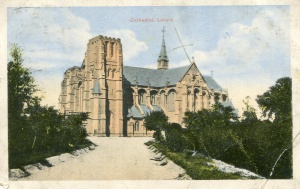
Anglican
- Lahore Cathedral (Cathedral Church of Resurrection) - consecrated in 1887
- St Andrew's (The Railway Church) - built in 1899 to serve the Railway colony, near the North Western Railway Headquarters
Roman Catholic
- Cathedral of the Immaculate Conception - built 1861
- Sacred Heart Cathedral - consecrated 1907, the seat of the Diocese of Lahore
- St Anthony's - also near the North Western Railway Headquarters on Empress Road
Education
Schools
- Convent of Jesus and Mary
- Queen Mary College
- Aitchison College Lahore, est 1886
- Picture of the teachers and students of St. Andrew School, Pakistan Railways (then NWR) at Lahore, set up in the late 19th century panoramio.com
Colleges/University
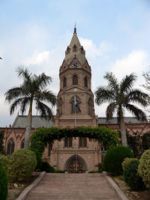
- Government College (now University) (1864)
- Islamia College
- King Edward Medical College (now University)
- University of Punjab
Health
Hospitals
- Lady Aitchison Hospital
- Lady Willingdon Hospital Introduction - KEMU
- Mayo Hospital (1871)
- Sir Ganga Ram Hospital (1921)
Cemeteries
- Gora Kabristan
- The BACSA Archive at the British Library Mss Eur F370 has the following references to cemeteries in Lahore
- 718 Lahore (General), Pakistan - Cathedral: inscriptions 1857 -1954 - New (Jail Road): 1923-, open
- 719 Lahore Annex, Pakistan - Photos of registers
- 720 Lahore Cantonment North, Pakistan - 1907-, open
- 721 Lahore Cantonment South, Pakistan - Mian Mir: 1851-1944, closed
- 722 Lahore Taxali Gate, Pakistan - 1849-, open
- Taxali Gate Cemetery in Lahor Indian-cemeteries.org
Commercial
Banks
- The Australasia Bank (1942)
- Punjab National Bank (1895)
Buildings
- Lawrence Hall (now part of Quaid-e-Azam Library) Photograph
- Montgomery Hall (now part of Quaid-e-Azam Library)
Military
The Cantonment was situated 3 miles east of the civil station of Lahore and until 1906 was known as Mian Mir (alternative spelling Mean Meer, Meean Meer). This link,[1] gives a description of Meean Meer c 1868, while this link[2] mentions the clean up and change of name to Lahore Cantonments.
Lahore was the head-quarters of the Punjab Light Horse and of the 1st Punjab Volunteer Rifles.[3] "A Beleagured City",is a parody by Rudyard Kipling about the proximity of the firing range of the Punjab Volunteer Rifles to the Lawrence Hall Gardens
RAF Lahore rafweb.org (retrieved 1 July 2014)
Transport
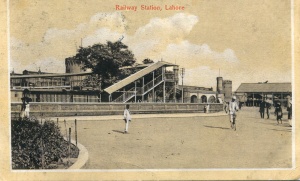
Railways
- Lahore Railway Station.
- Photographs: Lahore Railway Station c 1880s oldindianphotos.in
- Photograph: Lahore Railway station 1886 by John Burke from Imran H Khan’s page Photos of Old Pakistan, Planet Earth Blog
Lahore was the headquarters of North Western Railway. There were railway workshops and a railway colony.
Gardens and Parks
- Lawrence Gardens (1860) (now Bagh-e-Jinnah) - Article Montgomery Hall-Photo
- Minto Park (now Iqbal Park) near the Wall City, Fort and Badshahi Mosque.
Places of interest
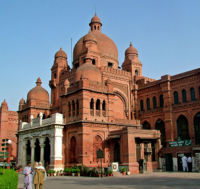

- Lahore Museum. The Mall Photo - 1900s
- Lahore Zoo (1872) The Mall. official website
- Zamzama Gun (Kim's Gun)
Monuments
- Walled City of Lahore
- Maryam Zamani (Begum shahi) Mosque (near Fort)
- Nawab Bahadur Khan's tomb. (used as a theater hall during the early period)[4]
- Mahabat Khan's tomb and Boundary Wall, Baghbanpura (near Shalimar Gardens)
- Prince Perwaiz's tomb. Chah Miran area.
- Wazir Khan's Hammam
- Wazir Khan's Baradari (served as soldier's quarters until cantonment shifted to Mian Mir.) Behind Lahore Museum.[5]
Protected Monuments
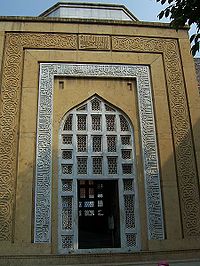
The following are historical monuments protected during this era. The year is brackets is the year of their notification.
- Akbari Sarai and Mosque (1911)
- Anarkali's Tomb (1924) (serves at the Punjab Records Office since 1891) in Punjab Civil Secretariat.[6]
- Asif Khan's tomb and compound (1911)
- Badshahi Mosque (1925)
- Buddhu's Tomb (1912) near Gulabi Bagh Gateway on Grand Trunk Road
- Chauburji (1913). Mozang
- Dai Anga's Mosque, Naulakha. (1913) (private residence of Mr. Henry Cone, editor of Lahore Chronicle. later sold to the Railways. restored as mosque in 1903)[7]
- Dai Anga's Tomb (1913). behind Gulbai Bagh Gateway
- Gulabi Bagh Gateway (1913)
- Hazuri Bagh and Baradari (1913, 1924) Photo-1900s
- Jahangir's Tomb (1911)
- Lahore Fort (1920, 1924)
- Mirza Kamran's Baradari (1935)
- Tomb of Musa Ahangar, Mosque and House (1914). near Railway Station.
- Nur Jahan's tomb (1911)
- Qutbuddin Aibak's Tomb (1914)
- Roshnai Gate (1935) (part of the fortification wall)
- Shalimar Gardens (1913)
- Wazir Khan's Mosque (1925)
Statues
The following are some of the people whose statues were erected during the period. All except one has been removed from their original locations.
- Queen Victoria
- King Edward VII
- Lala Lajpat Rai
- Professor Alfred C. Woolner
- Sir Ganga Ram
- Sir John Lawrence
Maps
- Lahore Map 1893 from Wikipedia Commons
- Lahore Map 1912 from the Historical Maps of Asia Collection, University of Texas, Austin
Photographs
- Some old photographs of Lahore from Flickr
- Photos by Ghilzai - Lahore panoramio.com (part of this collection)
Biographies
Religious Leaders
- George Alfred Lefroy, Bishop of Lahore The Life and Letters of George Alfred Lefroy D.D., Bishop of Calcutta, and Metropolitan by H.H. Montgomery
- Thomas Valpy French, Bishop of Lahore An Heroic Bishop The Life Story of French of Lahore by Eugene Stock
External links
- Lahore City Imperial Gazetteer of India
- "'A Feeling of Absence from Old England:' the Colonial Bungalow" by William J Glover. Home Cultures Volume 1 Issue 1 pages 61-82 2004(?). Contains references to Lahore from page 3 of the pdf. “By the late nineteenth century, Lahore was a desirable posting for European officers and civilians due to its large size, moderate climate, and relatively cosmopolitan range of institutions and activities.”
- Lahore: Blood on the Tracks by William Dalrymple 1997. archive of travelintelligence.com. (Another archived version). Also an episode in the 1997 TV documentary series Stones of the Raj
Historical books on-line
- "Lahore City", pages 37-40 and "Lahore Cantonment", page 40 from Imperial Gazetteer of India : Provincial Series Punjab Volume II The Lahore, Rawalpindi and Multan Divisions and Native States, 1908 Archive.org
- Gazetteer of the Lahore District : 1883-4 Deutsche Digitale Bibliothek
- Gazetteer of the Lahore District : 1893-94 Deutsche Digitale Bibliothek
- "Topographical and Sanitary Report on the Station of Meean Meer" by Dr T G Scot, 79th Highlanders, page 367 Army Medical Department: Statistical Sanitary and Medical Reports for the year 1861 (published 1863) Google Books
- Punjab disturbances, April 1919; compiled from the Civil and military gazette 1919 Archive.org
- "Lahore Central Jail", page 95 from Professional papers on Indian engineering, Volume 5 1868 Google Books
- Old Lahore: Reminiscences of a Resident by Colonel H R Golding 1924 Panjab Digital Library. Also available to read online on the Digital Library of India website.
References
- ↑ Indian Racing Reminiscences, page 5 by M. Horace Hayes 1883 Archive.org
- ↑ Reminiscences of an Indian Cavalry Officer, page 140 by John Sutton Edward Western 1922 Archive.org
- ↑ Imperial Gazetteer of India : Provincial Series Punjab Volume II The Lahore, Rawalpindi and Multan Divisions and Native States, page 40 1908 Archive.org
- ↑ Nadiem, Ihsan H. "Historic Landmarks of Lahore An Account of Protected Monuments" Lahore: Sang-e-Meel 2006 ISBN 969-35-1869-1 pg 101
- ↑ Nadiem, Ihsan H. "Historic Landmarks of Lahore An Account of Protected Monuments" Lahore: Sang-e-Meel 2006 ISBN 969-35-1869-1 pg 70
- ↑ Nadiem, Ihsan H. "Historic Landmarks of Lahore An Account of Protected Monuments" Lahore: Sang-e-Meel 2006 ISBN 969-35-1869-1 pg 57
- ↑ Nadiem, Ihsan H. "Historic Landmarks of Lahore An Account of Protected Monuments" Lahore: Sang-e-Meel 2006 ISBN 969-35-1869-1 pg 73